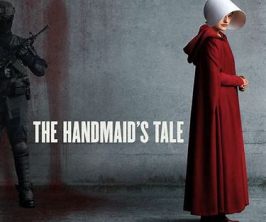
*with thanks to Margaret Atwood, The Handmaid’s Tale
In The Handmaid’s Tale women don’t
have their own names anymore.
They whisper them to each other
in order to re-member who they are:
June, Moira… maybe even Lydia
Their bodies aren’t their own.
If you are fertile, you are used to breed.
If you are infertile, but clever, you can be a Martha
and cook or clean for men, and their families.
Women don’t have families; they are part of a man’s family.
Or they could be an Aunt, someone who trains
the other women to be docile. To be afraid. To give in. To give up.
Not everyone will get the message, or be able to follow it:
Don’t let the bastards get you down.
The author, Margaret Atwood, made the choice
to not include anything in the novel that had
not happened in real life. Most especially
 the denial “it couldn’t happen here.” Because they thought that,
the denial “it couldn’t happen here.” Because they thought that,
and then it did happen. It happened in the fictional Gilead. It happened.
That’s the part I focus on.
It can’t happen here. But it’s happening. Then it happens.
Here we are saying it won’t happen. It can’t happen. But then, it’s happening.
And it’s happening now.
I sit with women friends. And we talk about the fact—
that it’s happening.
Women are being told they’ll be followed if they cross
state lines to get an abortion. If they cross into Canada, they could be followed.
Their bodies belonging to someone else— not to them.
They could get the death penalty if they miscarry.
My friends and I spend an evening
drumming and jamming and hanging out eating pizza.
We’re all women and tonight by chance, all lesbian women.
And someone brings up – you know they are trying to pass
a law that – and anyone can fill in the blank here
with whatever new possible terror is being proposed somewhere in these Unites States.
Because it’s happening.
Because it’s happening to women’s bodies now.
 Someone says we need a plan.
Someone says we need a plan.
Someone says we will have to toss our cell phones.
Someone says we can’t have our animals micro-chipped or use credit cards.
When we run.
Because that’s how they could follow us. Because with a cell phone, or a credit card, or a micro chip
we won’t be able to get away.
We laugh—but then we don’t laugh.
Because we are actually making a plan to get away—when…
we decide we should make a plan.
But then, we don’t– not yet.
Because really– is it really happening here?
We talk about getting to Oregon. How we like Oregon—but it rains.
We are Southern California girls—so Oregon?
But then again, we’re running for our lives, aren’t we?
So, what’s rain?
 We talk about Canada. How we would be able to get across to Canada?
We talk about Canada. How we would be able to get across to Canada?
Would we be able to get across?
And we aren’t talking about fiction. We are talking about the fact that it’s happening.
We aren’t saying–it couldn’t happen here anymore.
Because it’s happening.
We keep eating pizza. We hug and kiss each other’s cheeks goodbye.
Because for now, we are still laughing.
For now. For now.
We are still using each other’s real names.
–Marie Cartier
September 2019, United States of America
Marie Cartier has a Ph.D. in Religion with an emphasis on Women and Religion from Claremont Graduate University. She is the author of the critically acclaimed book Baby, You Are My Religion: Women, Gay Bars, and Theology Before Stonewall (Routledge 2013). She is a senior lecturer in Gender and Women’s Studies and Queer Studies at California State University Northridge, and in Film Studies at Univ. of CA Irvine.
Discover more from Feminism and Religion
Subscribe to get the latest posts sent to your email.


Atwood is a genius. I am a man and read the book long ago. We need to turn our world upside down. No more men such as Trump who want Barbie Dolls. We want real men and women. No more fakes such as the Orange Man.
LikeLike
Thank you for reading and posting!
LikeLike
This is frankly terrifying.
LikeLike
I agree… Sarah ♡ yr real name…
Best, Marie
LikeLike
Yes, it is happening now, as it has happened to us many times in patriarchal history. Back in the late 1970’s, I purchased a book by Sally Miller Gearhart called “The Wanderground,” which tells the fictional stories of women who leave the men a and boy children behind as they head to the bills to create a whole new culture. The book both terrified and excited me, and I wholeheartedly recommend it .
When “The Handmaid’s Tale” came out I could already see the beginnings of the Burning Times happening again. I fear that men will always seek absolute power over women and nature and the technologies almost exist for them to get their way. I have read comments by men about medical and pharmaceutical methods for finally making us “real” women.
I have to ask – how long are we going to obey, he “reasonable” and patient? When will we finally define ourselves for ourselves?
LikeLike
I read *The Wanderground* early 80s taking a class with Mary Daly at Boston College!! Fabulous– I totally remember the feeling of freedom in that book– flying. ♡♡♡
When exactly? Hopefully a woman gets elected 2020– it’s been time for awhile
LikeLike
“The author, Margaret Atwood, made the choice to not include anything in the novel that had not happened in real life.” When I first read this point and then re-read it in your blogpost, I got chills. This line alone has made me re-think a great a deal. I recently saw a movie about the holocaust (In The Darkness). The movie is a true story and it is harrowing enough to contemplate the lives of these survivors but seen through the eyes of Margaret Atwood’s tale is absolutely bone chilling. There is a scene where a Nazi soldier is killed and they hang 20 or so Polish citizens in revenge. They leave their bodies hanging in the town square as a warning. Yes we as human beings have done all these things and worse.
The question I have is how do we hold onto, reclaim, enjoy our humanity in the face of such horror?
LikeLike
Totally agree with you.
My immediate response is vote… right now that’s where my energies are going
LikeLike
I love this post and I relate. Thank you!
LikeLike
You’re so welcome! Keep up the good fight!
LikeLiked by 1 person
And . . . keeps happening
LikeLike
I am continually horrified by the many ways female bodies are under an epidemic of assault and oppression. It is so horrific a situation that it leaves me dizzy with despair. Thank you for voicing this message, and may we find ways, together, to protect female bodies from this holocaust.
LikeLike
thank you for posting- i totally agree
LikeLike